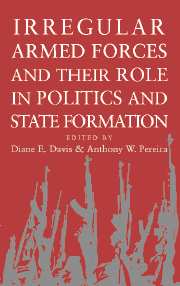Book contents
- Frontmatter
- Contents
- Contributors
- Irregular Armed Forces and Their Role in Politics and State Formation
- Introduction
- Part I The Basic Framework and Beyond
- Part II Deconstructing Armed Forces
- 6 Send a Thief to Catch a Thief
- 7 Reform and Reaction
- 8 Policing the People, Building the State
- 9 War-Making and U.S. State Formation
- 10 Politics Is Thicker Than Blood
- Part III Not Just the Nation-State
- Conclusion
- Index
8 - Policing the People, Building the State
The Police-Military Nexus in Argentina, 1880–1945
Published online by Cambridge University Press: 23 November 2009
- Frontmatter
- Contents
- Contributors
- Irregular Armed Forces and Their Role in Politics and State Formation
- Introduction
- Part I The Basic Framework and Beyond
- Part II Deconstructing Armed Forces
- 6 Send a Thief to Catch a Thief
- 7 Reform and Reaction
- 8 Policing the People, Building the State
- 9 War-Making and U.S. State Formation
- 10 Politics Is Thicker Than Blood
- Part III Not Just the Nation-State
- Conclusion
- Index
Summary
Policing is a crucial instrument that reveals the relations between a state and its citizens. In Argentina, a modern police force did not develop until after the national state was established in 1880. At that point, Buenos Aires was federalized and made the national capital. The Buenos Aires police became the police of the federal capital, directly subordinate to the president through the minister of the interior. Thus, the federal army and the police effectively consolidated the monopoly of legitimate violence, thereby putting an end to decades of factional struggles (Rouquié, 1985: 73). The result was the creation of bureaucratized forces distinct from the military that enjoyed state authority to coerce civilians and deliver them to judicial authorities.
This chapter focuses on the transformation and nationalization of policing in Argentina and its spread from Buenos Aires to the entire nation-state. This territorial shift resulted from the interplay of the national state's responses to contentious politics in Buenos Aires, and the need to protect the political order against perceived threats to national security. To achieve the internal pacification of the state effectively, police functions, increasingly seen in scientific terms, had to first share the definitions of politically destabilizing “enemies” and “threats.” The centralization of the police mirrors the centralizing efforts of the modern nation-state (Reinke 1997: 103; Tilly 1975).
In Argentina, we see that greater state discretion and indiscretion went hand in hand with the expansion of police arrangements.
- Type
- Chapter
- Information
- Publisher: Cambridge University PressPrint publication year: 2003
- 2
- Cited by

